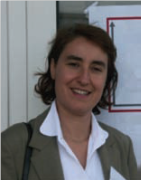Archives
Elisabete Martins
Special Sessions: Forty Under Forty | 12th World Congress of RSAI, May 29-June 01, 2018, Goa
Lead Organizer: Geoffrey J.D. Hewings, University of Illinois, USA and Nankai University, China
We are planning a series of special sessions at the World Congress to highlight the work of younger scholars (under 40 years of age). A maximum of forty presentations will be accommodated. There is no limitation on topics but the presentation should highlight innovative methodology, or new applications, creative use of data and important policy relevance. Sessions will be chaired by senior RSAI colleagues who will also serve as session discussants. The final session, to which all participants are invited, will focus on general comments and feedback and suggestions for preparation for publication.
Please submit your paper for consideration to Geoffrey Hewings (This email address is being protected from spambots. You need JavaScript enabled to view it.) in the following format:
Name:
Affiliation
Age
Title of Paper:
Abstract of Paper
A Maximum of three summary statements (one sentence each) highlighting the value added of the paper.
The deadline for submission is November 30, 2017.
http://regionalscience.org/2018worldcongress/
Northeast Regional Center for Rural Development NERCRD Postdoc Position
The Northeast Regional Center for Rural Development (NERCRD) is a small research and outreach unit located in the Department of Agricultural Economics, Sociology and Education within Penn State’s College of Agricultural Sciences. Our mission is to work on a range of issues with land grant universities and other partners in the Northeast as well as nationally in support of rural development.
The NERCRD seeks applications for a one-year post-doc position, with good chances of renewal subject to funding. The post-doc will be responsible for conducting economic and statistical analyses on a wide range of rural development topics, as determined by the Center’s emerging needs and priorities. There is a strong expectation that this research will contribute both to the science base as well as to informing U.S. rural economic development policy. A part of the research portfolio will include assessing the impacts of different federal policies over time and space. Importantly, the opportunity exists to work with Penn State’s Census Data Center. Examples of topics to be studied range from policy impact assessments (including the impact of farm subsidies and extension education); determinants of poverty including the roles of automation and global competition; and the interdependence of rural and urban areas, as well as agricultural and non-agricultural industries; to the determinants of health and well-being, including addiction and drug overdoses.
Qualifications: The candidate will have extensive training in state-of-the-art economics or a related field and econometric analysis, including spatial statistics, as well as excellent communications and writing skills. In addition, he or she will have extensive experience with a variety of statistical packages. The candidate needs to be able to both work well independently and also to function effectively in a team setting.
To apply send a statement of interest in the position, two writing samples, and names of and contact information for three references to Stephan Goetz at This email address is being protected from spambots. You need JavaScript enabled to view it. .
International conference on ‘Sustainable Urban and Regional Development – Research and Policy Challenges for the Asia-Pacific Rim’ in Beijing, China, 8-10 December 2017
THEME
SUSTAINABLE URBAN AND REGIONAL DEVELOPMENT RESEARCH AND POLICY CHALLENGES FOR THE ASIA PACIFIC RIM
DATE AND PLACE
December 8-10, 2017, Renmin University of China, Beijing, China
ORGANIZED BY:
Renmin University of China
The Regional Science Academy (TRSA)
Regional Science Association International (RSAI)
See attachment for more information
Call For Papers: Special Issue of Regional Science Policy and Practice: Local Entrepreneurship and Tourism: Policies and Practices in Peripheral Areas
Edited by Maria Giulia Pezzi (Gran Sasso Science Institute, Italy), Alessandra Faggian (Gran Sasso Science Institute, Italy) and Neil Reid (University of Toledo, USA)
Discussing the linkages between local entrepreneurship and tourism provides an intriguing starting point for a wider reflection on the role of existing policies and of emerging practices in fostering local development in peripheral areas.
Peripheral areas can be considered as areas relatively far from urban hubs providing essential services, typically suffering from de-anthropisation and marginalisation, though provided with a wide range of environmental, cultural and social resources.
In this sense, the investigation of the linkages between local entrepreneurship and tourism in peripheral areas, and of the role of existing policies and of the arising bottom-up practices in fostering local development, is aimed at deconstructing basic dichotomies often emerging when dealing with such issues, i.e. rural-urban and/or centre-periphery relationships, innovation vs tradition, authenticity vs mise en scene, agency vs inertia, social, cultural, economic mobility vs immobility etc. Moreover, focussing attention on the possible compliance or conflicting strategies of local actors with existing policies allows the possibilities arising from the analysis of local entrepreneurs as agents of change to be taken into consideration
In focusing on relevant case studies we are able to shed light on local entrepreneurship in peripheral areas in relation to tourism. Representative topics shall include, but are not limited to, the following:
- Theoretical and practical approaches to the concept of peripherality in relation to tourism entrepreneurialism and the emergence of peculiar tourism-niches (e.g. food tourism in rural areas);
- The role of local entrepreneurship in the development of tourism in peripheral areas as a form of resilience to the implications of (economic) marginality;
- Migrants’ forms of agency and their impact on local entrepreneurship in peripheral areas in relation to the leisure market (i.e. leisure migrants);
- The possible ways in which different takes on tradition and innovation can influence territorial marketing strategies in peripheral areas;
- The “tourismification” and/ or “touristification” (Salazar 2009) of material and immaterial heritage in peripheral areas as a possible consequence of local entrepreneurship;
- Key factors in the development of a tourism-led local entrepreneurship in peripheral areas;
- Challenges of tourism promotion and local development: the urban- rural nexus;
- Competitive strategies among local entrepreneurs in rural/peripheral area tourism.
We welcome submissions of relevant case studies analyses from economics, regional sciences, anthropology, sociology, geography, and critical tourism/leisure studies.
Submission Process
Abstracts of max 300 words, written in English, should be submitted for selection to Maria Giulia Pezzi at This email address is being protected from spambots. You need JavaScript enabled to view it., by August 31st, 2017. Please CC Alessandra Faggian (This email address is being protected from spambots. You need JavaScript enabled to view it.) and Neil Reid (This email address is being protected from spambots. You need JavaScript enabled to view it.).
Acceptance will be notified by September 15th, 2017.
Full papers to be submitted by December 20th, 2017
The special issue is expected to be published by June 2018.
The following information should be included with the abstract:
– Title of submitted paper
– Name(s) of Author(s), affiliation, email
– Professional background/current position
NARSC Student Paper Competition Submission Deadline Fast Approaching
If you are a student and would like to enter your paper into one of the two NARSC student paper competitions please note that the August 1 deadline for submitting your paper (and associated support materials) is fast approaching. There are two student-paper competitions - Graduate-Student-Author Paper Competition and Graduate-Student-Led Paper Competition. More details about each competition, including submission rules, can be found here - http://www.narsc.org/newsite/awards-prizes/narsc-student-competitions/.
If you have questions about the Graduate-Student-Author Paper Competition, please contact Professor John Miron at This email address is being protected from spambots. You need JavaScript enabled to view it..
If you have questions about the Graduate-Student-Led Paper Competition, please contact Professor Daoqin Tong at This email address is being protected from spambots. You need JavaScript enabled to view it..
FG IV – Project Officer - Expert for the Knowledge Centre on Migration and Demography
As the science and knowledge service of the Commission, the mission of DG Joint Research Centre is to support EU policies with independent evidence throughout the whole policy cycle.
The JRC is located in 5 Member States (Belgium, Germany, Italy, the Netherlands and Spain). Further information is available at: https://ec.europa.eu/jrc/
The current vacancy is with the Demography, Migration and Governance Unit, of the Space Security and Migration Directorate. This Unit carries out research in support of EU policies on migration and is responsible for the Knowledge Centre on Migration and Demography.
The European Commission Knowledge Centre on Migration and Demography (KCMD) is a Commission's independent body – steered by all the relevant services – tasked to provide solid scientific evidence for the development, implementation and evaluation of migration and demographic policies, not only in the framework of the migration and refugee crisis, but also in managing migration and addressing the demographic decline in the medium to longer term.
The KCMD is there to support and help to anticipate trends, and it serves the objectives of the European Agenda on Migration. The three pillars of the KCMD are: 1) Building the evidence base, conducting analysis and foresight; 2) Exploiting the knowledge base and facilitating uptake by stakeholders; 3) Partnerships and networking to extend the knowledge base. The JRC is responsible for its daily activities.
The successful candidate will contribute to on-going underpinning lines of research in the framework of the work undertaken by the KCMD. This research will concern the use of novel and alternative data sources to fill existing gaps of information relevant for migration and mobility. The successful candidate will be requested to handle, pre-process and analyse large amount of data covering, among others, the following:
development and testing of a model to predict migration flows and stocks on the basis of international air passengers’ data;
analysis of public perceptions on migration on the basis of data specifically collected from Twitter for the purpose;
analysis of international mobility and ethnic segregation on the basis of mobile phone data.
The candidates should have completed post-graduate level studies in the field of data science, computer science, statistics or relevant discipline. They need to have either a PhD degree or at least 5 years of relevant working experience after their master's degree and a good publication record.
The job requires capacity to clean, pre-process and analyse large volumes of data. A good knowledge of programming in Python, R and data analytics software is required.
Experience in developing models and in data-driven research in the fields of human mobility and migration or public perceptions will be considered an asset.
The candidate will be expected to co-author technical reports and scientific publications, in addition to servicing requests for analysis.
Good knowledge of oral and written English (B2 level), communication and presentation skills are necessary.
See attachment
FG IV – Project Officer - Labour economics and migration
As the science and knowledge service of the Commission, the mission of DG Joint Research Centre is to support EU policies with independent evidence throughout the whole policy cycle.
The JRC is located in 5 Member States (Belgium, Germany, Italy, the Netherlands and Spain). Further information is available at: https://ec.europa.eu/jrc/
The current vacancy is with the Demography, Migration and Governance Unit, of the Space Security and Migration Directorate. This Unit carries out research in support of EU policies on migration and is responsible for the Knowledge Centre on Migration and Demography.
The European Commission Knowledge Centre on Migration and Demography (KCMD) is a Commission's independent body – steered by all the relevant services – tasked to provide solid scientific evidence for the development, implementation and evaluation of migration and demographic policies, not only in the framework of the migration and refugee crisis, but also in managing migration and addressing the demographic decline in the medium to longer term.
The KCMD is there to support and help to anticipate trends, and it serves the objectives of the European Agenda on Migration. The three pillars of the KCMD are: 1) Building the evidence base, conducting analysis and foresight; 2) Exploiting the knowledge base and facilitating uptake by stakeholders; 3) Partnerships and networking to extend the knowledge base. The JRC is responsible for its daily activities.
The successful candidate will be expected to conduct research in the area of labour economics and migration and in particular to:
draft policy briefs synthetizing the existing literature and knowledge on the integration of migrants in the labour market;
clean and process microdata from international labour and social surveys;
perform statistical and econometric analysis;
formulate policy advice in the area of legal migration and the integration of migrants.
The candidate will be expected to co-author technical reports, scientific publications and policy briefs.
Qualifications:
The job requires an advanced university degree in economics and either a PhD degree or a minimum of 5 years of professional experience after having completed university studies in labour economics with background on quantitative methods and econometric models.
Key requirements are excellent drafting skills in English (C2 level) not only for academic papers but also for
communication material targeted at a policy audience. Oral English C1 level.
The candidate should have proven track record in applied labour economics research and publications in international peer-reviewed journals.
Desirable requirements are expert knowledge and experience in the use of statistical and econometric software (e.g. R, SPSS, STATA).
Experience of working on issues related to migration would be desirable.
See attachment
New issue (number 37) of Investigaciones Regionales - Journal of Regional Research
Dear colleague:
We have just published a new issue of the journal Investigaciones Regionales - Journal of Regional Research (Issue Nº 37). It is now available both on line and print version.
About Investigaciones Regionales – Journal of Regional Research:
The founding aim of Investigaciones Regionales–Journal of Regional Research was to create a prestigious journal through which to disseminate quality research carried out in the broad academic and professional field of regional, urban and territorial studies. The review process of the papers submitted to the Journal follows international standards.
Investigaciones Regionales-Journal of Regional Research is ranked as Q2 by Scimago JRC (Scopus), in Economics, Econometrics and Finance, and indexed in other scientific and academic international databases (Emerging Source Citation Index (ESCI), EBSCO, ProQuest, EconLit, RePec, DOAJ, Redalyc, Latindex, Fuente Académica, …).
The Journal has a multidisciplinary approach, welcoming submissions from fields such as Economics, Geography, Sociology, Land Planning and Political Science, whose scientific focus, originality and added value contribute to the dissemination of new ideas and methodological approaches, strengthening and improving the quality of the publication, via its email.
The contents of this issue are:
Articles:
- ¿Por qué incumplen fiscalmente las Comunidades Autónomas?- Santiago Lago Peñas, Xoaquín Fernández Leiceaga, Alberto Vaquero
- Relevancia, pertinencia y socialización del conocimiento, ¿cómo contribuyen los investigadores a la innovación de Ensenada, México?- Mayer Cabrera-Flores, Santos López Leyva, Arturo Serrano Santoyo
- El efecto de la distancia económica sobre la colaboración científica entre universidades. Evidencia para las regiones del sur de Europa- Ana Fernández Pérez, Esther Ferrándiz León, M.ª Dolores León Rodríguez
- Métodos de entropía cruzada generalizada: una aproximación a la medición del Producto Interno Bruto para los municipios del Valle del Cauca - Colombia- Paola Andrea Garizado Román, Esteban Fernández Vázquez, Henry Duque Sandoval
- Los factores explicativos del abandono temprano de la educación y la formación en las regiones españolas- Siro Bayón-Calvo, Helena Corrales-Herrero, Olga Ogando Canabal
- The uneasy coexistence of the Spanish foral and common regional finance systems- Antoni Zabalza, Julio López-Laborda
Surveys and debates:
- Instituciones y crecimiento económico: ¿consenso en la literatura?- Yakira Fernández-Torres, Juan Carlos Díaz-Casero, Julián Ramajo-Hernández
European Regional Policy:
- Marco jurídico y principales instrumentos de la cooperación transfronteriza institucional en Europa- Eusebio Medina García
Books reviews:
- Cities as Political Objects Historical Evolution, Analytical Categorisations and Institutional Challenges of Metropolitanisation- Juan R. Cuadrado Roura
To contact Us and Submit Manuscripts:
Investigaciones Regionales – Journal of Regional Research
Email: This email address is being protected from spambots. You need JavaScript enabled to view it.
Yours sincerely,
Investigaciones Regionales – Journal of Regional Research
7TH ANNUAL CONFERENCE OF THE ARGENTINE REGIONAL SCIENCE ASSOCIATION, Villa María, Córdoba, 23 y 24 de Agosto de 2017
OVERVIEW
The National University of Villa María, Córdoba and the Argentine Regional Science Association (SAER) invites you to participate in the 7th Annual Meeting to be held on 23 and 24 August 2017 in Villa María, Córdoba.
The 7th annual conference will cover a wide range of topics on Regional Economics and Local Productive Development, including:
- The debate about the future of the local productive profile
- Financing of development programs
- Local development entrepreneurs and best practices
- Macroeconomics and local and regional development
- Bioeconomy and regional impact
Previous Seminars have attracted speakers from different countries. We welcome scholars, researchers, students as well as corporation and government executives. We will also host special panels on regional topics. You can either present your research work or just attend. There will be a session of work and/or thesis in progress.
SUBMISSION PROCEDURE
Submissions (extended abstracts up to 1,000 words or full papers) should include title,
keywords, JEL classification, author(s)’ full name(s), affiliation, address, email and phone of
the (responsible) author. Submissions (in pdf file format only) must be made by email only to
This email address is being protected from spambots. You need JavaScript enabled to view it.
DEADLINES
- Submission of papers or extended abstracts: July 20th, 2017
- Notification of acceptance: July 30th, 2017
- Submission of final papers/work in progress: August 12th , 2017
The organizers will invite participating authors to be discussants of a paper
Winners RSPP Annual Paper Award For the Best Paper in Regional Science Policy and Practice
RSPP Annual Paper Award
For the Best Paper in Regional Science Policy and Practice
Winners 2017
|
|
|
Akihiro Otsuka and Mika Goto (2015) - Estimation and determinants of energy efficiency in Japanese regional economies. Regional Science Policy & Practice 7 (2), 89-101 “The paper contains a full empirical attempt to model and a significant regional issue of policy and practice concern: the spatial patterns of energy efficiency across the prefectures of Japan. Useful findings of the study are clearly spelled out for policy-makers. The paper is itself a model of how regional science methods can be harnessed for making contributions to policy and practice. As such, is a most meritorious demonstration of the underlying concept for our relatively new journal and thus highly deserving of receiving the award. Identification and estimation of variables that are understood and can be used by policy-makers.” |
AND
|
|
|
Roberto Camagni and Roberta Capello (2015) - Rationale and design of EU cohesion policies in a period of crisis. Regional Science Policy & Practice 7 (1), 25-4 “A great literature review and an important (continuing) EU issue. A reflective and policy-prescriptive paper focused on EU regional policies in the context of a period of economic downturn. Broad-ranging, the paper marshals a variety of data to buttress its argument. A nicely done contribution. A prospective paper with great impact well rooted theoretically and with sound methods.” |
About Us
The Regional Science Association International (RSAI), founded in 1954, is an international community of scholars interested in the regional impacts of national or global processes of economic and social change.




